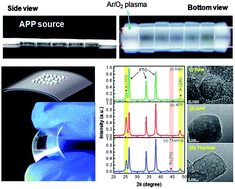A key challenge to the industrial application of nanotechnology is the development of fabrication processes for functional devices based on nanomaterials which can be scaled up for mass production. In this report, we disclose the results of non-thermal radio-frequency (rf) atmospheric pressure plasma (APP) based deposition of TiO2 nanoparticles on a flexible substrate for the fabrication of dye-sensitized solar cells (DSSCs). Operating at 190 °C without a vacuum enclosure, the APP method can avoid thermal damage and vacuum compatibility restrictions and utilize roll-to-roll processing over a large area. The various analyses of the TiO2 films demonstrate that superior film properties can be obtained by the non-thermal APP method when compared with the thermal sintering process operating at 450 °C. The crystallinity of the anatase TiO2 nanoparticles is significantly improved without thermal agglomeration, while the surface defects such as Ti3+ ions are eliminated, thus providing efficient charge collecting properties for solar cells. Finally, we successfully fabricated a flexible DSSC with an energy conversion efficiency of 4.2% using a transparent plastic substrate. This work demonstrates the potential of non-thermal APP technology in the area of device-level, nano-enabled material manufacturing.

You have access to this article
 Please wait while we load your content...
Something went wrong. Try again?
Please wait while we load your content...
Something went wrong. Try again?


 Please wait while we load your content...
Please wait while we load your content...